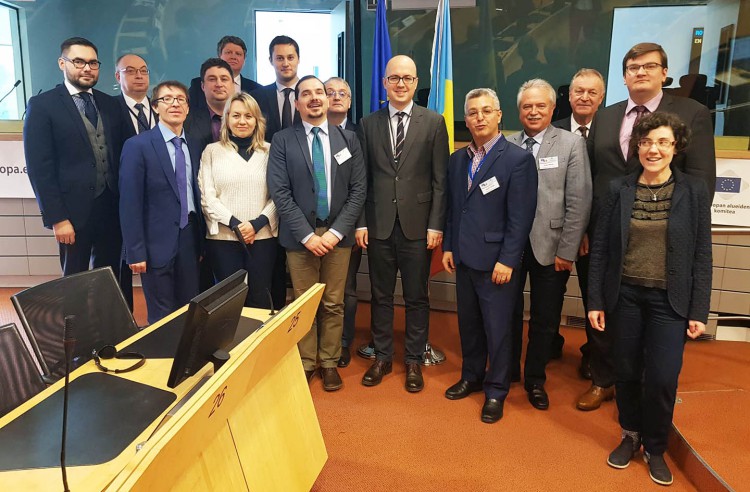Trade unionists, together with other partners, will approve in Brussels a Declaration on the process of implementation of the Moldova-EU Association Agreement
Today, March 6, 2018, in Brussels, Belgium, is being held the third meeting of the EU-Moldova Civil Society Platform, where the implementation of the EU-Moldova Association Agreement is under discussion. The platform in question is made up of representatives of the civil society of the Republic of Moldova and of the European Economic and Social Committee.
On behalf of the National Trade Union Confederation of Moldova (CNSM) Sergiu Sainciuc, CNSM Vice President, Elena Carchilan, head of the Labour Inspectorate of Trade Unions and Sergiu Iurcu, head of the CNSM Social-Economic Protection Department, participate in this meeting.
At the hearing, the trade unionists came up with an ample report on the social impact of the implementation of the Association Agreement and the developments that took place in the post-signing period. Among the most acute problems were the following: the living standard in general; low earnings; low population occupancy rate; maintaining and enhancing informal employment; a reform of the pension system that left some unsolved problems; an inefficient system of ensuring state protection in the field of occupational safety and health; continue the liberalization of the field of labour relations without involving and taking into account the views of the trade unions, thus diminishing the role of social dialogue and partnership.
Participants noted that urgent action is required to adopt urgent measures to increase wages of public sector employees and to set the minimum wage to the level of the guaranteed minimum wage in the real sector of the economy in order to keep young people on the labour market and to reduce migration purpose of work.
At the same time, they emphasize that the process of improvement of the Labour Code can be achieved taking into account the international labour standards to which the Republic of Moldova is a party. In this chapter it is necessary to mention that art. 371 of the Agreement stipulates that the level of protection existing in the country must be maintained when implementing it.
Also, in connection with the situation created in the field of safety and health at work, it is necessary to: strengthen the institutional capacities of the State Labour Inspectorate (human resources, computing, information systems, endowment with cars, etc.) as a result of its empowerment with the right to investigate accidents at work.
In the context of the above, a statement will be adopted at the end of the meeting which will include the opinion of the trade unions on the impact of the Association Agreement, including the other parties – non-governmental organizations and employers participating in this event. This statement will be subsequently brought to the attention of the Council of Europe and the Government of the Republic of Moldova.
Department of mass media and international relations of CNSM



